The Music Man
Meredith Wilson (Book, Music & Lyrics)
Palo Alto Players
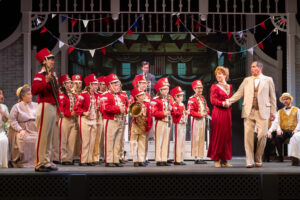 Musicals often burst onto the stage with numbers that arouse an audience to peak attention and leave fond impressions (and earworms) that can last a lifetime. Among the dozens of opening numbers that are my big-sound, big-number favorites are the likes of Belle entering the village in Beauty and the Beast, three sailors hitting New York for one day in On the Town, and the fabulous turn-of-the-century panorama of events and people that opens Ragtime. But dear to my heart has always been a group of traveling salesmen on a jerky, bumpy train rattling off in a clipped, heated argument “Whatdayatalk? Ya can talk … ya can bicker” in Meredith Wilson’s 1957-premiering The Music Man. The coordinated movements of the steam-train passengers combined with clever, clipped lyrics is a perfect introduction to what is certainly one of the country’s most favorite, most staged musicals. With numbers like “Seventy Six Trombones,” “Ya Got Trouble,” “Lida Rose,” and “Til There Was You,” The Music Man is today well represented in the Great American Songbook.
Musicals often burst onto the stage with numbers that arouse an audience to peak attention and leave fond impressions (and earworms) that can last a lifetime. Among the dozens of opening numbers that are my big-sound, big-number favorites are the likes of Belle entering the village in Beauty and the Beast, three sailors hitting New York for one day in On the Town, and the fabulous turn-of-the-century panorama of events and people that opens Ragtime. But dear to my heart has always been a group of traveling salesmen on a jerky, bumpy train rattling off in a clipped, heated argument “Whatdayatalk? Ya can talk … ya can bicker” in Meredith Wilson’s 1957-premiering The Music Man. The coordinated movements of the steam-train passengers combined with clever, clipped lyrics is a perfect introduction to what is certainly one of the country’s most favorite, most staged musicals. With numbers like “Seventy Six Trombones,” “Ya Got Trouble,” “Lida Rose,” and “Til There Was You,” The Music Man is today well represented in the Great American Songbook.
As someone who has reveled many times to the opening click-clacks of these salesmen traveling the plains of 1912 Iowa, I am excited to report that the current staging of The Music Man by Palo Alto Players has all the brassiness, the barbershop harmonies, and the unabashed mixture of high jinks and sentimental sappiness that audiences from coast to coast have loved for the past sixty-seven years. Guided by Lee Ann Payne’s directorial spark and spunk that unabashedly celebrates yesteryear’s Smalltown, America, a massive, talented cast of almost forty sing and dance up a storm to produce a toe-tapping fun and funny evening where humming along is almost impossible not to do.
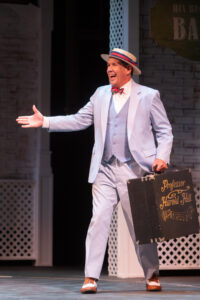 Hiding behind a newspaper to avoid being recognized as the shyster he is, one salesman on the train hops off the train with intentions to trick a community that “there is trouble in River City” for all its youngsters. With the zealousness of a revival preacher, Harold Hill warns the wide-eyed townsfolk that the sins of its youth will soon multiply due to the arrival of a new billiard hall. (Unfortunately for the salesman, it happens to be owned by Mayor Shinn who does not cotton to the idea of his new pool table being singled out as sin-generating).
Hiding behind a newspaper to avoid being recognized as the shyster he is, one salesman on the train hops off the train with intentions to trick a community that “there is trouble in River City” for all its youngsters. With the zealousness of a revival preacher, Harold Hill warns the wide-eyed townsfolk that the sins of its youth will soon multiply due to the arrival of a new billiard hall. (Unfortunately for the salesman, it happens to be owned by Mayor Shinn who does not cotton to the idea of his new pool table being singled out as sin-generating).
Touting himself as a ‘Professor’ from the “aught-five class of the Gary Conservatory of Music,” Hill proceeds quickly to convince the initially skeptical townspeople that band instruments, uniforms, and instructional books are the answer to all their town’s “trouble with a capital ‘T’ that rhymes with ‘P’ and that stands for pool.” As the Professor, Alex Perez immediately commands both their attention and ours with a big-stage singing voice that rings with confidence and a smile and manner that is impossible not to like.
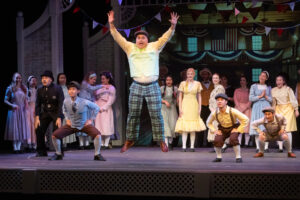 That Harold Hill knows nothing about music is not a problem. He has confides to his ol’ pal from past shady schemes, Marcellus Washburn – a thoroughly delightful Dane Lentz who later proves to dance with twinkle-toe prowess – his plans to slip out of town by a late-night train about the time he will have collected $800. That will be about the moment the townspeople realize his so-called “Think System” (no music practice required) has left them with instruments that their uniformed kids cannot play.
That Harold Hill knows nothing about music is not a problem. He has confides to his ol’ pal from past shady schemes, Marcellus Washburn – a thoroughly delightful Dane Lentz who later proves to dance with twinkle-toe prowess – his plans to slip out of town by a late-night train about the time he will have collected $800. That will be about the moment the townspeople realize his so-called “Think System” (no music practice required) has left them with instruments that their uniformed kids cannot play.
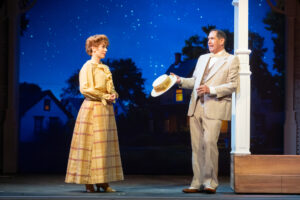 But in this particular town, Professor Hill’s proven scheme of swindle is about to run into a major flaw; and her name is Marian, the Librarian (a lyrically voiced Alicia Teeter who sings with both sparkle and just enough sustained vibrato to sell her every number). Even though Marian Paroo is suspicious from Day One of this glad-handing Hill, she soon captures the Professor’s heart – something he had not planned would happen. And in the meantime, his bubbling, outgoing presence is changing a town of complainers and gossipers into one where townswomen are practicing for a Grecian dance performance, where school board members who hated each other are now inseparable as a singing quartet; and where the librarian’s lisping, shy brother is loving his new coronet and talking up a storm to whoever will listen.
But in this particular town, Professor Hill’s proven scheme of swindle is about to run into a major flaw; and her name is Marian, the Librarian (a lyrically voiced Alicia Teeter who sings with both sparkle and just enough sustained vibrato to sell her every number). Even though Marian Paroo is suspicious from Day One of this glad-handing Hill, she soon captures the Professor’s heart – something he had not planned would happen. And in the meantime, his bubbling, outgoing presence is changing a town of complainers and gossipers into one where townswomen are practicing for a Grecian dance performance, where school board members who hated each other are now inseparable as a singing quartet; and where the librarian’s lisping, shy brother is loving his new coronet and talking up a storm to whoever will listen.
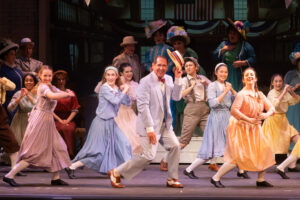 The transformations of the town come to full life in Lee Ann Payne’s wonderfully choregraphed numbers in which a stage-packed group of kids and teens shine time and again as they execute flawlessly high-energy moves of many dance styles from tap to ballet to soft shoe and many more. When joined by the adult members of the large ensemble, the mixed set of all ages, sizes, and heights raises voices big and harmonious and dance in lines, circles, couples, and singles to near stop the show in numbers like the rip-roaring “Seventy-Six Trombones,” the hilarious “Marian the Librarian,” and the eye-popping “Shipoopi.”
The transformations of the town come to full life in Lee Ann Payne’s wonderfully choregraphed numbers in which a stage-packed group of kids and teens shine time and again as they execute flawlessly high-energy moves of many dance styles from tap to ballet to soft shoe and many more. When joined by the adult members of the large ensemble, the mixed set of all ages, sizes, and heights raises voices big and harmonious and dance in lines, circles, couples, and singles to near stop the show in numbers like the rip-roaring “Seventy-Six Trombones,” the hilarious “Marian the Librarian,” and the eye-popping “Shipoopi.”
Small-scale choreography is also noteworthy as the coordinated moves of the four school board members (James Jones, Jason Mooney, Michael Rhone, and Richard Portune) involving straw hats and in-line body bends, arm extensions, and foot dances only make their beautiful, barbershop blends even more impressive in “Sincere,” “It’s You, and of course, the perennially popular “Lida Rose.” They develop an obsession of always being together and ready to break at any moment into four-part, close harmonies that swell like waves up and down the musical scale.
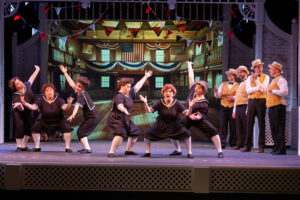 Not to be outdone, “The Ladies” of the town are vocally excellent and stars in their stage presence and antics as both the town’s chicken-pecking gossips in “Pickalittle (Talk-a-Little)” and as draped dancers in their “Eulalie’s Ballet” where they hilariously depict scenes from a Grecian urn. The ensemble of six brings heart to their characters in the way each makes her character unique, quirky, and like the neighbor lady one might know next door.
Not to be outdone, “The Ladies” of the town are vocally excellent and stars in their stage presence and antics as both the town’s chicken-pecking gossips in “Pickalittle (Talk-a-Little)” and as draped dancers in their “Eulalie’s Ballet” where they hilariously depict scenes from a Grecian urn. The ensemble of six brings heart to their characters in the way each makes her character unique, quirky, and like the neighbor lady one might know next door.
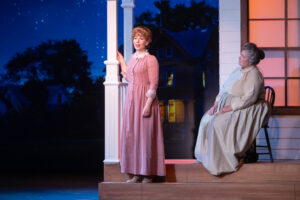 In this large cast, many individuals leave memorable moments. Gabrielle McColgan is Marion’s mother, Mrs. Paroo, a woman whose Irish brogue is thick, endearing, and authentic and whose singing voice zings with personality plus. Her young son, Winthrop, is also a natural as portrayed by Henry Champlin (alternating the role with Russell Nakagawa – the recipient of the night’s longest and loudest applause after his adorable yet spirited “Gary, Indiana.”
In this large cast, many individuals leave memorable moments. Gabrielle McColgan is Marion’s mother, Mrs. Paroo, a woman whose Irish brogue is thick, endearing, and authentic and whose singing voice zings with personality plus. Her young son, Winthrop, is also a natural as portrayed by Henry Champlin (alternating the role with Russell Nakagawa – the recipient of the night’s longest and loudest applause after his adorable yet spirited “Gary, Indiana.”
Drew Benjamin Jones is an appropriately sneaky and sleazy anvil salesman, Charlie Cowell, who is out to put Harold Hill behind bars. Cameron Weston is the righteous and ridiculous Mayor Shinn who is quick to follow Cowell’s suggestion to send Hill out of town in tar and feathers. His Honor the Mayor also nearly blows a gasket in flaying-arm exasperation with the town’s (and his wife’s) enthrallment with the so-called Professor.
The mayor’s wife, Eulalie Mackenknie Shinn, goes from being blindly loyal to stubbornly independent of her dictating husband, portrayed in full comic flair by a local-audience favorite, Linda Piccone. Their “egads”-spouting and rebellious teen, Zaneeta Shinn, is amusingly played by Sheridan Stewart while dynamically-voiced Andrew Mo with beaming personality plays her would-be boyfriend — all-boy, good-hearted Tommy Djilas.
Much of the nostalgic charm of the evening derives from Partick Klein’s scenic design that includes both seamlessly entering/exiting stage elements and a giant backdrop of richly colored projections of the town’s 1912 streets, parks, and interiors. Katie Strawn’s vast array of costumes bring the early 20thcentury to full life as well as enrich the humor and the heart of such characters as the black-draped, Grecian-dancing lady folk, with the wig and hair artistry of Karen Davies providing their period-perfect, crowning touches.
Even though The Music Man is in many ways outdated and glorifies a time and setting when diversity was practically non-existent in the ways we know today, it is still clear why Meredith Wilson’s musical tribute to an earlier era remains so popular. Professor Harold Hill comes to a town that was previously mired in its own routines, rivalries, and rituals; and the music he brings transforms the town and all its inhabitants and ultimately changes him. That same music – as so invigoratingly shared by this impressive cast under the music direction of Tony Gaitan – strikes just the right chords to produce big smiles and fond, future memories for the lucky audiences of Palo Alto Players.
Rating: 4 E
The Music Man concludes its run 2 and 7:30 p.m. May 11 and 2 p.m. May 12, 2004 in a two-hour, thirty-minute (one intermission) production by Palo Alto Players at Lucie Stern Theatre, 1305 Middlefield Road, Palo Alto, CA. Tickets are available online at www.paplayers.org or by calling the Box Office at 650-329-0891.
Photo Credits: Scott Lasky
